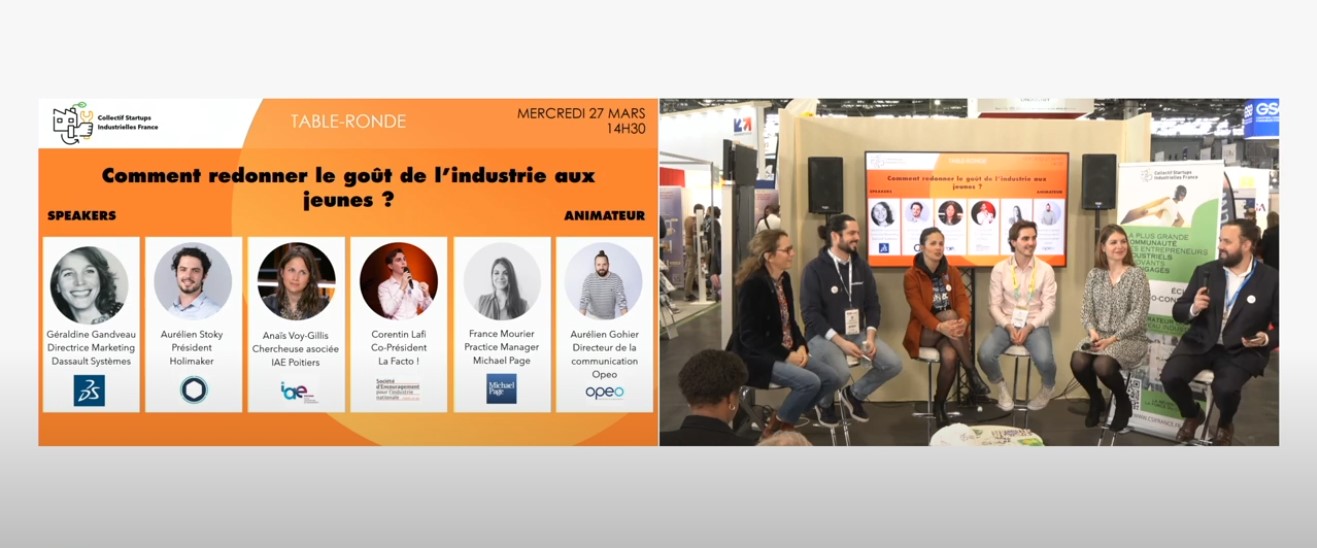
- Homepage
- Our latest news
- How can we get young people interested in industry again?
How can we get young people interested in industry again?
Géraldine Gandveau from Dassault Systèmes, Aurélien Stoky from Holimaker, Anaïs Voy-Gillis from IAE Poitiers, Corentin Lafi from La Facto and France Mourier from Michael Page were all on hand to talk about the challenges of recruiting in the industry during the GI 2024 round table.
French industry, in the midst of a major transformation, faces a dual challenge: attracting young talent while combating an outdated image and skills shortages. Géraldine Gandveau from Dassault Systèmes highlights the global quest for new profiles, while Aurélien Stoky from Holimaker highlights recruitment difficulties in critical sectors such as production and sales.
A sector in full transformation
Long perceived as a heavy and arduous industry, the sector's image is struggling to modernize in the collective imagination. Parents and teachers still see the industry as a domain of the past, even though it has largely evolved thanks to technological innovations and the emergence of start-ups. “It's essential to give manufacturing a new meaning to attract young people,” explains Aurélien Stoky, who notes that more and more young people are attracted to manual professions where they can see the concrete results of their work.
A modern image
One of the major obstacles to the attractiveness of industry lies in the perception of the term itself. Corentin Lafi, founder of La Facto!, explains that while industrial products (cars, furniture, etc.) appeal to young people, industrial companies themselves suffer from an offbeat image. “Young people are more attracted to the idea of dynamic start-ups than to companies often perceived as isolated and out of touch with their social and creative aspirations,” he adds.
Attracting talent: beyond salary
Faced with these facts, industrial companies need to go beyond simply offering jobs and salaries. Corentin stresses the importance of creating spaces for exchange and creativity within companies to meet the expectations of younger generations. Dassault Systèmes, for example, is banking on innovation and flexible working conditions to attract talent, offering telecommuting, an attractive campus in Vélizy and digital collaboration tools.
For France Mourier of Michael Page, the difficulties of recruiting technical talent are exacerbated by reindustrialization objectives and ecological constraints, but also by the career management of older employees and generational shocks. “Young people are looking for more dynamic and less specialized career paths than their elders,” she explains.
Structural challenges to be met
The example of Dassault Systèmes is interesting. Through acceleration programs, the company allows its employees to devote 10% of their time to helping start-ups, thus strengthening their commitment while contributing to the mentoring of young startups.
Despite these initiatives, the salary issue remains a key issue for young graduates, who often come up against rigid pay scales in industry, respectively in more agile sectors such as services. If the industry offers solid long-term careers, young people today aspire to positions that combine meaning, flexibility and attractive remuneration.
Promote manual professions
Beyond modernizing working conditions, the industry must also rethink the promotion of manual professions. Although crafts have regained popularity, prejudices surrounding industrial professions remain stubborn. “It is imperative to break the stereotype of the ‘bad student who ends up in industry’,” explains one of the speakers, recalling that the positions offered are numerous and diverse.
Finally, the key to attracting young talent may lie in education. Raising students' awareness of the opportunities offered by the sector, by highlighting career prospects and the societal impact of the industry, seems essential to respond to the challenges of reindustrialization and modernization of the sector's image.








